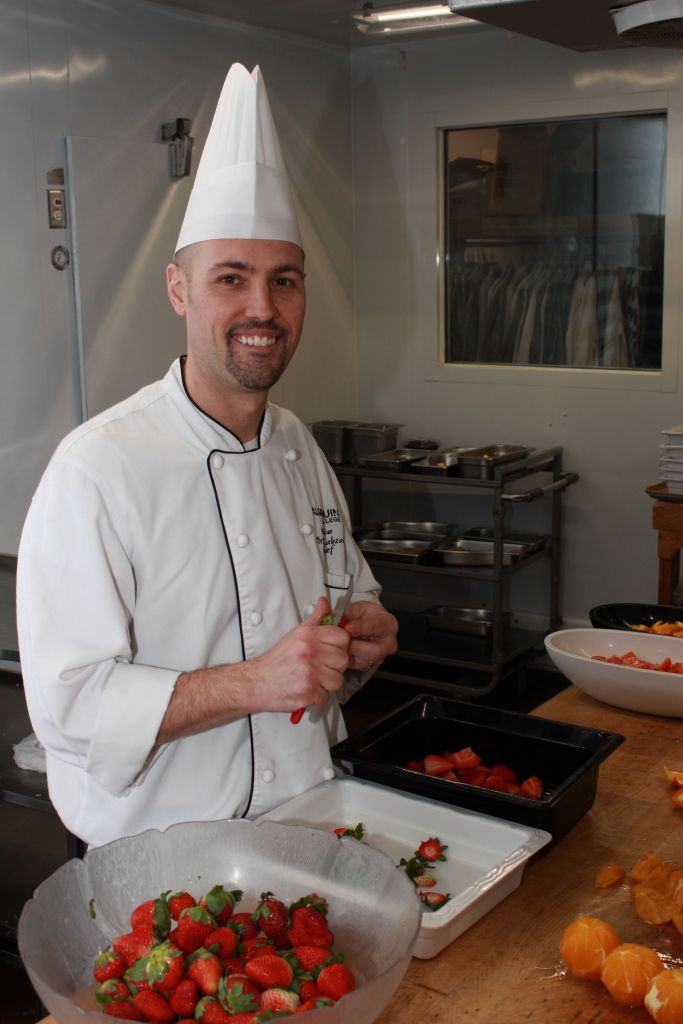There’s a sense of community when a group of people come together to work on one project — especially when it revolves around one small farm producing 800 pounds of garlic.
How could anyone need that much garlic? Algonquin College serves approximately 13,000 people a day, so they could probably use a clove or two.
In September and October of last year, Algonquin joined a pilot program that Mohawk College started for the purpose of increasing their sustainability and procurement of local food. General manager of Food and Conference Services, Mary Baxter, led a team to ensure word was getting out to the students about this exciting new project at Algonquin.
“One of our goals was to really keep the students involved,” Baxter said.
Baxter and her team hired two students to help with the project planning and also hired woodworking students to build a wooden cart to distribute fresh vegetables. Another student designed the local food logo they use on all of their locally sourced items. As well, you can always find students in the kitchen with executive chef Russell Weir.
“The more stuff we buy locally and produce ourself, the healthier it’s going to be,” chef Weir said. It’s going to be organic, it’s going to be pesticide, hormone and antibiotic free.”
It was a lot of work for chef Weir to meet with Algonquin’s 18 partners in this food procurement project. He visited all 18 farms to make sure the suppliers passed Algonquin’s comprehensive checklist, including food safety standards.
“We had to determine basically did they fit our definition of local, what products do they have, how can we use those products, do they deliver…do they practice safe food handling procedures and finally do they have competitive pricing, so that we can maintain affordable product for our students,” chef Weir said.
Algonquin’s definition of local is anything within a 200 km radius around campus, which includes eastern Ontario and western Quebec.
Some of the farmers had trouble producing any crops at all last year because of all the rain. Chef Weir had to constantly change the menu based on what produce he could get his hands on. With the weather affecting what crops are growing, they always need to think of new menu ideas which include substituting ingredients they wouldn’t normally use.
However, when it comes to garlic Algonquin certainly has enough. Silver Spring Farms, which is located in the west end of Ottawa, employs people from the Ottawa-Carleton Association for Persons with Developmental Disabilities to plant and harvest garlic. Chef Weir wanted to be in business with them for their quality garlic and for their initiative. Students from Algonquin went out to the farm to help them plant the garlic in the summer and returned in the fall to help maintain the growing fields.
“That was like a win, win, win. The students got a chance to do some on-site work, the farm benefitted from us buying it and we benefitted from it because it was an excellent product to start with and then we didn’t have to worry about buying commercial garlic all-year long,” chef Weir said.
It took a lot of work to peel, cut, purée, freeze and bag all of that garlic but chef Weir uses it daily in homemade soups, pastas, salads and pizza. Algonquin also has a trained butcher on-site to make sure they treat the raw product respectfully and utilize every part of it.
In October of last year, they held a harvest lunch for the farmers and students to have a taste of the new products. Students were able to have one-on-one conversations with the farmers and ask any questions about their lives as farmers.
“The suppliers really enjoyed it as well as the students in making that connection to the names that they see throughout Ottawa, not just on our campus,” Baxter said.
You can see the local food logo all around campus at many of the Food Services locations. Chef Weir continues to create new dishes with students every week to showcase the freshest ingredients possible.
For years to come, Algonquin hopes to continue its relationships with its suppliers and increase its sustainability. It’s not necessarily about increasing the list of suppliers they have but ensuring they get the best ingredients from as close as possible.
“The more sustainable part of that is to have one supplier that can supply multiple products for us versus having five suppliers offer multiple products. The goal is not necessarily to make the list longer of the suppliers but to make the list longer of the items that we can bring onto campus,” Baxter said.


